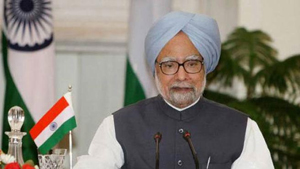
Gurgaon, May 23: India faces an entire spectrum of security challenges and there is need for reorientation of the country's strategic thinking and reappraisal of its higher defence organisations, Prime Minister Manmohan Singh said Thursday.
Stating that India was situated at the strategic crossroads of Asia and astride one of busiest sea lanes of the world, the prime minister said: "It is imperative that the country's defence professionals remain abreast of the complex environment we face and the avenues that are available as a result of the enormous transition taking place in India."
He was addressing a gathering after laying the foundation stone for the Indian National Defence University (INDU) in Binola, Gurgaon, near the Indian capital.
The prime minister said India's security had never been stronger than it was today.
"India faces entire spectrum of security challenges and this is inevitable as we live in a difficult neighbourhood which holds the full range of conventional, strategic and non-traditional challenges," he said.
"Taken together these challenges and opportunities should prompt reorientation of our strategic thinking and a reappraisal of our highest defence organisation," he said.
He said the government was making defence acquisition less vulnerable to unethical practices.
"We have been guided by the objective of making defence acquisition transparent, smooth, efficient and less vulnerable to unethical practices. We will continue to seek the highest standards of the probity in defence acquisition," he said.
The defence university, Manmohan Singh said, would be a unique autonomous institution of national importance.
"It is meant to ensure that the country, government armed forces benefit from the best military advise that is available. It is also meant to provide our defence professionals with a deep understanding of the inter play between all attributes of national power," he added.





Comments
Add new comment